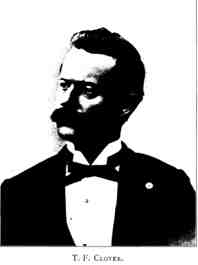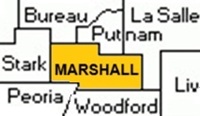
 Thomas Francis
CLOVER. This able lawyer of Henry, Illinois, now serving as state’s attorney,
was born on the Delaware Indian reservation in the Territory of Kansas, January
23, 1859. His father, G. CLOVER, is a native of Indiana, of German descent.
During the revolutionary war two brothers came over with the Hessian army, and
taking a fancy to the country and its brave men who fought so courageously for
their independence, concluded to remain here. One of the brothers settled in New
York and his descendants yet remain there in large numbers. The other settled in
Pennsylvania. From the Pennsylvania brother our subject traces his descent.
Thomas Francis
CLOVER. This able lawyer of Henry, Illinois, now serving as state’s attorney,
was born on the Delaware Indian reservation in the Territory of Kansas, January
23, 1859. His father, G. CLOVER, is a native of Indiana, of German descent.
During the revolutionary war two brothers came over with the Hessian army, and
taking a fancy to the country and its brave men who fought so courageously for
their independence, concluded to remain here. One of the brothers settled in New
York and his descendants yet remain there in large numbers. The other settled in
Pennsylvania. From the Pennsylvania brother our subject traces his descent.
In early childhood G. CLOVER was taken by his parents to Grundy county,
Illinois, and there grew to manhood. Before attaining his majority, however, he
went to Hardin county, Iowa, where he formed the acquaintance and wed Miss Susan
D. MADDOX, who was also born in Indiana, but grew to womanhood in Iowa. While
both were natives of the same state and both lived for a time in Illinois, it
was not until removal to Iowa that they became acquainted. By this union were
two sons, Edward L, an attorney and democratic politician of Morris, Illinois,
and our subject.
Soon after their
marriage the young couple moved to Kansas and settled on the Indian reservation,
and there began to improve a farm. They were not, however, permitted to occupy
it and were forced to abandon their claim, not having sufficient means to pay
the price demanded. While residing here with the intention of making it their
permanent home our subject was born.
From Kansas the family returned to
Iowa. The war for the union was now in progress, and the husband and father
determined to enlist. Bidding his lived ones good-bye, as a private in the
Sixteenth Iowa Volunteer Infantry, he marched to the front, after spending a few
days in camp at Marshalltown. The Sixteenth Iowa is noted as being one of the
fighting regiments from that state. In almost all the great battles of the
southwest it was actively engaged, including Shiloh, Iuka, first and second
battles of Corinth and Holly Springs. It was with Sherman on his march to the
sea. In all this service Mr. CLOVER did his duty faithfully and well, and while
meeting many hairbreadth escapes, came off without a serious wound.
While
at Goldsboro, North Carolina, the time of the regiment expired, and there Mr.
CLOVER received his discharge. Taking a vessel he went to New York and there by
rail hurried to his home. Before arriving there he was offered a colonelcy and
$1,000 in cash if he would again enter the service. While only a private he was
a thorough drill master and his fact was appreciated by those in authority. But
three years’ active service was enough and he put aside the offer that he might
again enjoy the society of wife and children.
While he was in the service
his wife returend with the children to Grundy county, Illinois, and thither he
hastened. On a farm near Gardner they resided for several years, until on
account of the failing health of the father, they removed to Labette county,
Kansas, and there remained three yeas, and again returned to the old home in
Grundy county, Illinois, where they still reside, Mr. CLOVER being postmaster at
Gardner.
The boyhood and youth of our subject were passed in Grundy
county, where he was engaged in farm work during the summer months, while
through the winter season he attended the district school, completing his course
at the Morris high school, of which he is a graduate. At the age of eighteen
years he engaged in teaching for one term in Kansas, where his father was then
living. With the design of making the law profession his life work, at Oswego he
began reading law in the office of Webb & Glass, prominent attorneys of that
city, and was admitted to the Kansas bar in 1880 before he had attained his
majority.
Returning to Illinois, Mr. CLOVER was examined before the
supreme court of this state, and was admitted to practice here. Locating at
Braidwood, he there followed his chosen profession until coming to Henry in
1889. He has here built up a large and paying practice, ranks high among his
professional brethren, and in 1892 was elected state’s attorney for four years,
being the regular democratic nominee. He takes an active part in political
affairs, and at the Peoria convention in 1894 placed in nomination the
democratic candidate for congress, Hon. George O. BARNES, of Lacon. He also goes
as a delegate to state conventions, and takes a prominent part in all campaigns,
being particularly active in committee work.
On the 27th of April, 1893,
Mr. CLOVER was united in marriage with Miss Losty DELZER, who was born in Henry
and was there reared and educated. She takes quite an active part in the Woman’s
club, and is a devout member of the German Catholic church. Socially, Mr. CLOVER
is a charter member of Henry lodge, No. 489, Knights of Pythias.
Our
subject is a man who thoroughly loves his profession, and is eminently gifted
with the capabilities of mind which are indispensable at the bar. He was counsel
in the Seeley case in which Mrs. Seeley applied for separate maintenance, and
argued before the appellate and supreme courts that eth plaintiff would not have
to prove the same degree of cruelty for separate maintenance as for divorce. The
supreme court supported this view, and the fact has become precedent in such
matters. He has also been engaged on many other important cases in which he has
come off victorious. In preparing a case for trial every fact, however
insignificant, is carefully studied and its possible relevancy to the merits of
the case weighed and considered. He is thoroughly familiar with authority and
never at a loss for a precedent. He has a large circle of personal friends, the
regard of the entire profession and has won the respect of all with whom
business or social relations have brought him in contact.
Extracted May
2011 by Norma Hass from The Biographical Record of Bureau, Marshall and Putnam
Counties, Illinois, 1896.
| Bureau Putnam La Salle | |||
| Stark |
 |
||
| Peoria | Woodford | ||

